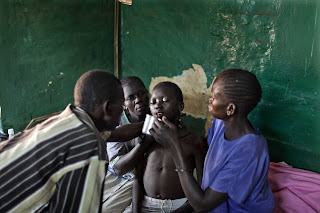I felt like Dorothy yesterday as I rode my bike through town. Just days earlier, the world around me
had been shaded in a sepia-toned haze.
The ground was a prickly grey of desiccated vegetation, while the sky
remained shrouded in a dusty veil of brown. South Sudan was both looking and feeling like the bleak,
arid, landscape that sensational journalists have pinned it as.
And then, unexpectedly, while folding clothes or writing a
letter one afternoon, the rain came.
It poured down upon Mundri, pounding roofs, flooding streets, and
knocking mangos from trees and into the arms of smiling, drenched children. Heavy branches bended and snapped,
while leaves shook and flew about wildly.
When it was all over and the roaring downpour quieted to a pattering of
raindrops, I stepped outside to survey the damage. Heavy branches littered the muddy ground and water ran off
in all directions. The air blew a
cool wind that could only remind me of England. Grateful for cooler weather and an excuse to watch Bridget Jones’ Diary, I went on my way, forgetting
about Mother Nature’s incessant and miraculous works.
The following morning I went out to my running trail and saw
a transformed earth. What was once
a dirt path was now a neon green jungle of twisted vines and broad leaves! The nature that stood before me didn’t
even look real—it was like I was thrust into an old technicolor film of the
fifties, walking through overlapping colors that were all competing to shine
through the brightest. The trees on
our compound were full again and were flowering white and red buds. The pink and yellow flowers that
Larissa had carefully planted were finally breaking through the dark soil. Even in town, the color abounded. At the market, stands overflowed with
baskets full of orange mangos, which had ripened and fallen from the rain. The aisle for selling bread was taken
over by bunches of greens—so much so that one couldn’t even walk through that
area without stepping on a cluster of earthy green goodness. Splotches of bright patterns dotted the
road in the distance, as women in long flowing wraps walked to their gardens to
plant their seedlings for the year.
And the sky—oh the sky—it finally returned to its deep blue hue—the
color that I would have only seen on a few lucky days in October back in the
states. Indeed, color had burst
into Mundri along with the beginnings of rainy season, and I couldn’t have been
happier.
This sense of living in color has also seeped its way into
those dark, discontented corners of my mind. I’m always looking to the hypothetical future to get my hope,
making plans of all the things I’m going to do. I tend to view my daily schedule as a means to a greater end,
failing to find the joy in the here and now, because my work here is seemingly
unfinished, unpolished, or even unplanned. In Africa, everything is messy at first glance, and it is
easy to find myself saying, “When . . .
happens, then I’ll be satisfied.” I’ve been experimenting with giving up control of my work
here in S. Sudan (which has not been easy). However, the pay off has been the joy of experiencing Africa
in all of its colorful quirks.
Instead of grumbling over all the imperfections in the film John, Andrew,
and I have made, I’ve simply enjoyed the fact that I have something creative to
share with the people of Mundri. I
can sit in that stifling MAYA office and watch while sweaty children squeeze
their way onto our laps to gawk at a real Mundri-made movie. I can laugh when certain scenes get cut
off or when our makeshift boom mic. lowers into a shot. No one else is noticing. I can laugh when I watch the finished
product of the drama I have created with the teens at my church. As they fumble over lines, break
character, and get advice from noisy audience members, I can smile. I can smile because they are having
fun—I am having fun. I’m slowly starting to learn how to
relax, how to be more like a Moru person here in Mundri. It is all about embracing the here and
the now that God has blessed me with and seeing the worth of a messy, colorful
life (as much as my heart tends to see things in black and white).
"Forget the former things; do not dwell on the past. See, I am doing a new thing!
Now it springs up; do you not perceive it?
I am making a way in the wilderness and streams
in the wasteland." -Isaiah 43:18-19


















